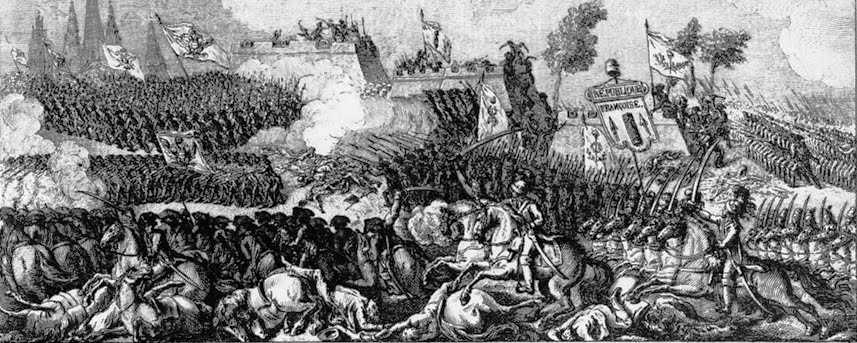Classical
tactical systems were easily integrated into eighteenth-century warfare by
military philosophes. While the reader may question how a phalanx armed
with pikes could function against an eighteenth-century enemy armed with
muskets, French philosophes were not as sceptical. Though the pike had
been phased out at the beginning of the seventeenth century, many believed that
warfare contained unchangeable and eternal rules, and therefore that technological
change did not alter the fundamental nature of warfare.[1]
Tactician Joly de Maizeroy, for example, states:
No change could
affect the universal fundamentals of the art of war: Though the invention of
powder and of new arms have occasioned various changes in the mechanism of war,
we are not to believe that it has had any great influence on the fundamental
part of that science, nor on the great manoeuvres. The art of directing the
great operations is still the same.[2]
These
universal principles dictated that the offensive position should always be
sought; that battle must be presented when possible, for “it is a paradox to
hope to win without fighting;” [3]
that depth was the key factor for success in infantry formations; that a small,
disciplined group of soldiers acting together would overcome greater numbers;
and that warfare could be perfected through theory, not necessarily by
practice.[4]
These lessons were supposed to be applicable regardless of time or place.
Accordingly, even the introduction of firearms could not alter the nature of
the battlefield.[5] The
poor accuracy and limited power of muskets during the eighteenth century did
little to contest this theory. Thus, despite some resistance, which will be
discussed shortly, a large number of tacticians felt that a system which relied
on depth, a quick offensive burst, and a small group of disciplined and
cohesive soldiers, would be as successful on the eighteenth-century battlefield
as it had been in antiquity, and set about designing it.
[1] Delbruck, 177.
[2] Maizeroy,
quoted in Gat, Origins, 40. The
concept of Universal Principles will be returned to in the analysis of Jomini
later in this study.
[3] Memoirs de Montecuculli, quoted in Guillaume Le Blond,
“Guerre,” L’Encylopedie. http://encyclopedie.uchicago.edu/.
[4] Le Blond, “Guerre;” Lancelot
Turpin de Crissé, Commentaires sur les Memoires de
Montecuculi, Generissime des Armees, & Grand-Maitre de l’Artillerie de
l’Empereur (Paris: Chez Lacombe, 1769), xi.
[5] Indeed, Puysegur argued that there could be no greater
mistake than to assume that the introduction of firearms changed the nature of
war. Instead, he claimed, the success of all the great generals was a result of
their adherence to the universal rules of war, and recommended looking not only
to Montecuculi and Turenne for proof, but to Arrian’s Campaigns of
Alexander, Thucydides’ History of the Peloponesian War, the Commentaries
of Caesar, and to Polybius and Xenophon. Puysegur, vol.1, 4-5.

No comments:
Post a Comment